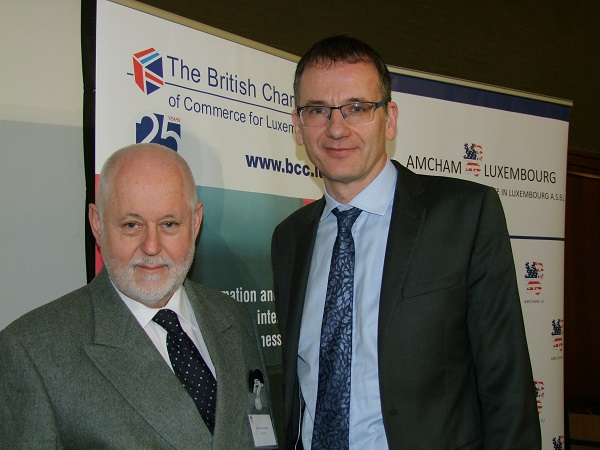
On Monday lunchtime, the American Chamber of Commerce in Luxembourg (AMCHAM), together with the British Chamber of Commerce (BCC), hosted the first of three events co-hosted by both chambers, looking at the issues of Brexit and the new administration in the US, amongst others; this ABAL Luncheon was held at the DoubleTree by Hilton in Luxembourg-Dommeldange.
AMCHAM Chairman, Paul Schonenberg, opened the event at which the British Ambassador to Luxembourg had been invited as the special guest to be the first to address the issue of Brexit and the new US administration, and what effects they will have globally, with Robert Deed, representing the British Chamber of Commerce, introducing HM Ambassador John Marshall.
The other two events in the series include: (2) on 27 February the British Chamber of Commerce (BCC), in collaboration with with AMCHAM, has invited Luxembourg's Minister of Finance, Pierre Gramegna, to address the same issues from the perspective of the Luxembourg government; and (3) on 7 March, AMCHAM, in collaboration with the BCC, has invited Luc Frieden, to address the same issues again, but this time from the perspectives of having worked in London (with Deutsche Bank) as well as well as from Luxembourg's - he is currently Chairman of BIL and was Minister of Justice in Luxembourg's previous government.
Ambassador Marshall took a look ahead at what 2017 will have in store for the UK, including the beginning of negotiations on the UK’s exit from the European Union (specifically Brexit and its foreign policy), building a close and productive relationship with the new US administration, and galvanising a concerted international effort to eradicate modern slavery.
He thanked AMCHAM and the BCC for coming up with the joint initiative, and congratulated the British Chamber on its 25th anniversary.
On Brexit, he recalled the the British government came under fire at the end of 2016 for not having a plan; he felt this was unfair as there was much to do and discuss beforehand, and the British Prime Minister stated in November that Article 50 would be triggered before the end of March. He referred to the Supreme Court's decision which dictated, amongst other things, that Scotland, Wales and Northern Ireland did not need to be consulted on the decision to leave the EU, just the two Houses of Parliament in Westminster.
Subsequently, on 17 January, British Prime Minister Theresa May spoke at Lancaster House and stated that Britain would leave, not only the EU, but also the single market and the customs union. He underlined that she stressed that it remains in Britain's national interest that the EU is a success, and that the Member States would prosper. Although Britain would be leaving the EU, they would not be leaving Europe.
He stated that PM May wants to guarantee the rights of EU citizens living in Britain as well as the rights of British citizens in the EU, as it is the right and fair to do. Britain is looking for a new strategic partnership with the EU on shared values.
Some have characterised Britain's decision to leave the EU as Britain turning in on itslef; he said that nothing could be further than the truth. Facing global challenges together has been there for all to see, including facing piracy off the coast of Somalia, contributing to the EU's role in securiing the Paris climate agreement, the issues in Iran and in the Crimea, etc., and that Britain has a lot to offer in these areas in the years to come. Britain also has a strong foreign policy outside the EU, including through bilateral relations as well as through NATO and the Commonwealth.
He stated that Britain is one of a handful of countries to spend 2% of GDP on defence, and the only country to spend 0.7% of GDP on development; Britain is the largest military power in Western Europe. He talked about humanitarian projects around the world, quoting big numbers in the process. This is Britain showing leadership on a global stage.
He mentioned that PM May was the first foreign leader to meet the new President of the USA, Donald Trump. She delivered important messages and underlined that NATO is the cornerstone of the US defence; President Trump later confirmed that he is 100% behind NATO. She also emphasised the issue of multi-lateralism, but acknowledged that reform of institutions such as the UN, may be nesessary to move forwarsd.
He recalled that the new US administration has garnered more headlines and controversies than its predecessors; yet the fundemental fact remains that there is no other country with which Britain has forged such strong relations over the past decades.
On the issue of modern slavery (human trafficking, child sexual exploitation, etc.), PM May has set it as her twin goal of eradicating it in the UK and reducing it considerably overseas, defending the freedom of men, women and children whom are exploited. Britain will be driving an international initiative through its global diplomatic network in an attempt to deliver change.
In finishing, he said that Britain will continue to show leadership and will continue to engage in dialogue. In the subsequents questions from the floor, on the issue of education, he said that it would be difficult to address each and every aspect before Article 50 is triggered, but acknowledged that universities in the UK are keen to grow internationally. On the issue of the Republic of Ireland (with which Britain shares its only land border), Ambassador Marshall said that Britain also has a special relationship with Ireland and "lots of discussions" have been taking place; he did acknowledge that nobody knows what the solutions will look like, but stressed that nobody wants borders like before and there is a shared determination that the outcome is one that will work for all communities.
Photo (L-R): Paul Schonenberg, AMCHAM; Amb John Marshall








